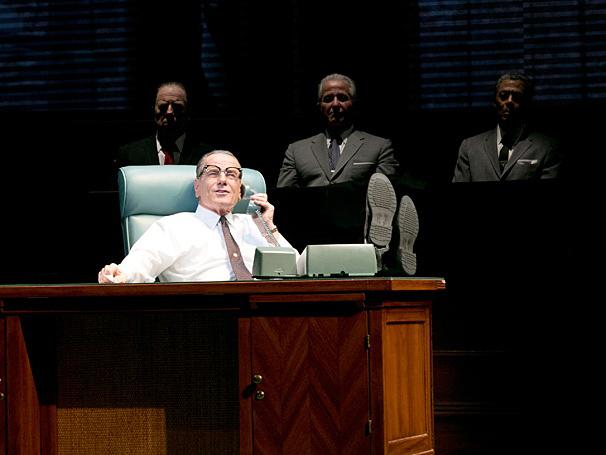
Politics is like a circus act — with so many moving parts, it is hard to keep an eye on what is real and what is just another trick. The ringmaster in Robert Schenkkan’s new Broadway play “All the Way” is President Lyndon B. Johnson, who manages the chaos following the assassination of President John F. Kennedy from center stage.
The play, which features “Breaking Bad’s” Bryan Cranston as the 36th president, follows Johnson’s dramatic first year in office, including the passage of the Civil Rights Act and Johnson’s eventual election in 1964. Audiences will not be treated to a great Broadway play about the Vietnam War — though this conflict was going on at the same time, it is not the focus of the production.
Instead, the play follows the progress of history, as Johnson’s Civil Rights Act alienates the loyal Democrats in the South. The friction between Johnson the President and Johnson the Texan drives much of the action, as does the swelling popularity of Martin Luther King Jr.
Cranston brings an animated Johnson to life, constantly swearing, shouting, arguing and fighting his way into the history books. However, Cranston seems to overpower the other actors, and the scenes without him lose the simmering intensity Cranston brings.
This domination is partly because of the lack of characterization for the other players. Michael McKean’s J. Edgar Hoover digs up dirt; Brandon Dirden’s MLK is cool in his resolve; and Betsy Aidem’s Lady Bird Johnson rarely wavers from her husband. This cast sinks underneath the weight of 1964’s significance and frequently becomes lost in the shuffle of over 40 characters in the play.
Director Bill Rauch’s flourishes allow the play some room to breathe. The stage is set up like an auditorium with three stands — left, right and center — that often bring the characters physically together, even when all of them are not participating in the scene. The staging helps convey the almost innumerable people who were involved in Johnson’s first year as president.
For such a landmark year, the play is remarkably low on drama. This lack of tension is because both the passage of the legislation and Johnson’s re-election are assured outcomes, and therefore there is no suspenseful build-up. The sheer density of the history bogs down the play, and “All the Way” ultimately feels more like a history lesson than a staged adaptation of the tumultuous 11 months from assassination to re-election.
While Cranston may be at the center of the ring attempting to lend order to the madness, he is no match for the information overload presented in “All the Way.” The promise of unmasking the White House always leads to a certain sense of curiosity, but Schenkkan’s play offers little in terms of insight or intriguing nuance. Theatergoers savvy with regard to American history would be smart to sit this offering out.
A version of this article appeared in the March 11 print edition. Michael Domanico is managing editor. Email him at [email protected].























































































































































